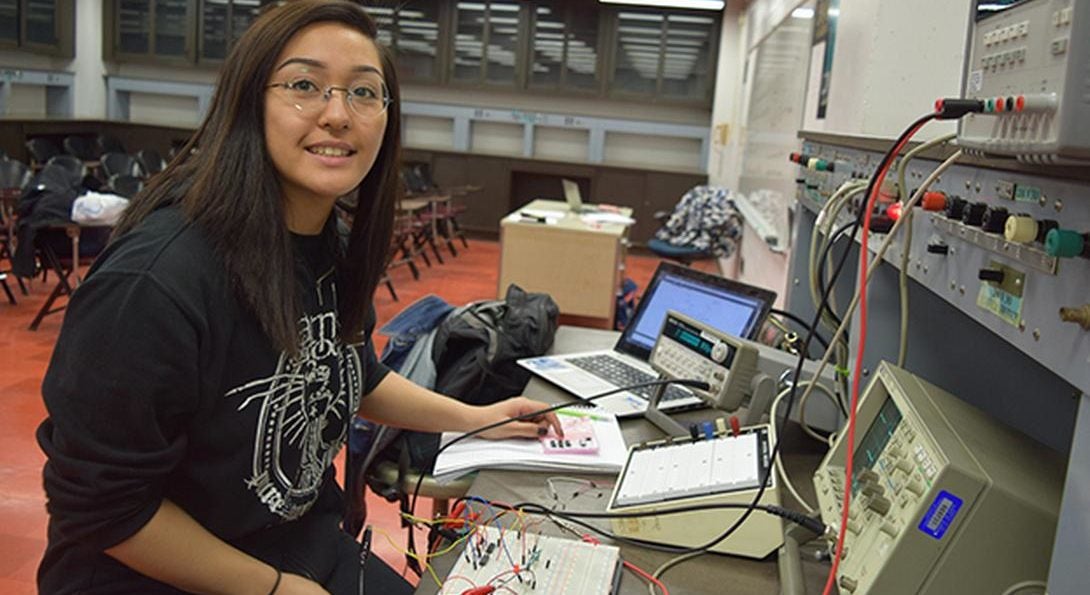ECE modifies curriculum to improve student experience

story title Heading link
The world is constantly changing, and to ensure our students are getting the best education that will prepare them for graduate school or the working world, the Department of Electrical and Computer Engineering (ECE) enhanced its curriculum with several positive changes. The modifications are geared toward improving the curriculum for mainly second-year students and transfer students in all three undergraduates programs – Electrical Engineering, Computer Engineering, and Engineering Physics.
“We looked very hard at all of our course offerings, and we decided to think in terms of labs, experience for students, and whether the course content was up to date with all that is going on in technology these days,” said ECE Professor Daniela Tuninetti. “We saw that we could make some adjustments to have a nice streamlined curriculum for students to be able to graduate within four years.”
The changes are about making sure the classes are up-to-date to provide the best experience for students. The revisions remove redundancy, and outdated or unnecessary content. It also introduced new classes.
“Especially on the Computer Engineering side of the program a bunch of classes were revamped,” said Tuninetti. “The faculty decided to remove some classes to make space for more modern and advanced topics.”
For example, the faculty decided that the content of the sequence ECE 267 “Computer Organization I” and ECE 366 “Computer Organization II” no longer adequately addressed the needs of the computer engineering industry. Instead students should have a single computer organization course and, in addition, an introduction to embedded systems, which are pervasive in electronics today. ECE 267 was removed, ECE 366 revamped (along other Computer Engineering classes) and a new class created, with number ECE 266. In the new curriculum, all the ECE students will take the new class ECE 266 “Introduction to Embedded Systems,” which will have more hands-on labs, practical experience, and something they can really use as a skill when they apply for jobs.
This is just one example of how the faculty reviewed all the courses and decided to update some of them.
“This new class [ECE 266] will now have a lab, so students will be able to not just see the concepts in theory, but also to practice on them,” said Tuninetti. “They will be working on applications to be developed on a chip that the industry uses. This will help students to get internships because they are learning practically relevant skills.”
The department also adjusted some of the requirements in basic math and science, which are based on changes in the courses offered by other departments to ensure all three ECE degree programs conform with the ABET accreditation criteria.
“What we did was to look at how can we still meet the ABET requirements without sacrificing hours that are important in the ECE department,” said Tuninetti. “Essentially, the changes will free up some hours in the curriculum, which will allow room for extra engineering credits. This is one of the big changes in the new curriculum.”
Another big change is the elimination of the “Advanced Core” category. At present, students could choose to take four ECE courses out of a list of six courses. With the elimination of one course from the department offering and by designating another one as Technical Elective, the remaining four courses will become mandatory. This was possible without increasing the number of credit hours needed for graduation because credit hours were freed up due to the changes in the basic math and science requirements.
“ECE students will take all four of the advanced core courses instead of only three, which will give them a more rounded foundation,” said Tuninetti. “For example, Electrical Engineering students will get exposure to signal processing, communication, control, and solid state devices. Based on knowing the different aspects of electrical engineering, students will make a better informed decision when choosing their technical electives at the 400 level.”
The faculty made similar changes to the Computer Engineering program. Upon review, the faculty discovered some of the classes had hidden prerequisite classes in Computer Science and it was difficult for ECE students to take those classes.
“We thought of all the possibilities, we decided that the hidden prerequisites should be gone, and we shortened the prerequisite chain,” said Tuninetti. “We looked at all the classes and said ‘Is this really needed?’ We looked at everything and made sure the curriculum didn’t have any unnecessary classes.”
Apart from the faculty, curriculum changes incorporate feedback and suggestions from partners outside of UIC. The ECE department received feedback from its external advisory board, which is made up of industry professionals and alumni members. The faculty also looked at recommendations and feedback they received from ABET during the 2020 accreditation cycle.
“We also took into consideration the feedback we received from the Illinois Board of Higher Education when they visited us in fall,” said Tuninetti. “Especially for the Engineering Physics program where students take many classes in the Physics department.”
The curriculum work will be an ongoing project. The faculty recommended it to be under review to ensure it is always up to date. This will allow to make gradual changes, instead of major ones, down the road.
“We would also like to think about new course offerings for new emerging areas, such as Big Data, Machine Learning and Internet of Things” said Tuninetti. “This is very important for students in terms of job opportunities and internships.”
For any questions about the curriculum changes, please contact your student advisor. To learn more about the ECE Department and curriculum, visit www.ece.uic.edu.